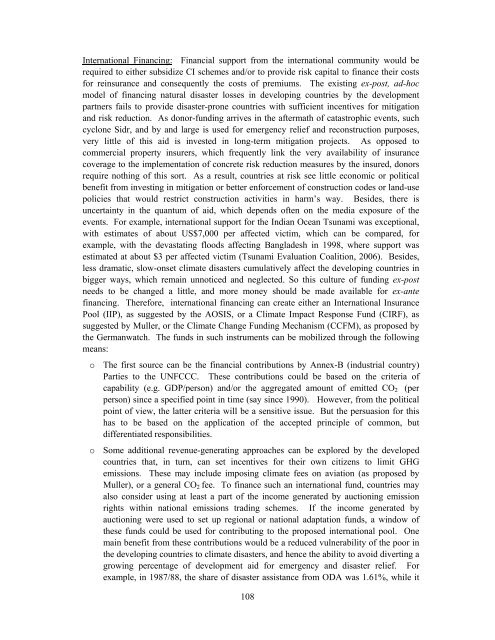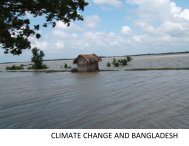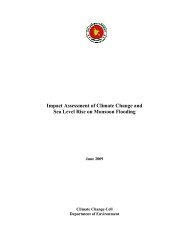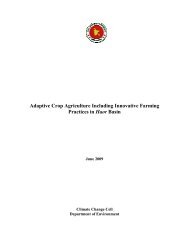Crop Insurance as a Risk Management Strategy in Bangladesh
Crop Insurance as a Risk Management Strategy in Bangladesh
Crop Insurance as a Risk Management Strategy in Bangladesh
You also want an ePaper? Increase the reach of your titles
YUMPU automatically turns print PDFs into web optimized ePapers that Google loves.
International F<strong>in</strong>anc<strong>in</strong>g: F<strong>in</strong>ancial support from the <strong>in</strong>ternational community would be<br />
required to either subsidize CI schemes and/or to provide risk capital to f<strong>in</strong>ance their costs<br />
for re<strong>in</strong>surance and consequently the costs of premiums. The exist<strong>in</strong>g ex-post, ad-hoc<br />
model of f<strong>in</strong>anc<strong>in</strong>g natural dis<strong>as</strong>ter losses <strong>in</strong> develop<strong>in</strong>g countries by the development<br />
partners fails to provide dis<strong>as</strong>ter-prone countries with sufficient <strong>in</strong>centives for mitigation<br />
and risk reduction. As donor-fund<strong>in</strong>g arrives <strong>in</strong> the aftermath of cat<strong>as</strong>trophic events, such<br />
cyclone Sidr, and by and large is used for emergency relief and reconstruction purposes,<br />
very little of this aid is <strong>in</strong>vested <strong>in</strong> long-term mitigation projects. As opposed to<br />
commercial property <strong>in</strong>surers, which frequently l<strong>in</strong>k the very availability of <strong>in</strong>surance<br />
coverage to the implementation of concrete risk reduction me<strong>as</strong>ures by the <strong>in</strong>sured, donors<br />
require noth<strong>in</strong>g of this sort. As a result, countries at risk see little economic or political<br />
benefit from <strong>in</strong>vest<strong>in</strong>g <strong>in</strong> mitigation or better enforcement of construction codes or land-use<br />
policies that would restrict construction activities <strong>in</strong> harm’s way. Besides, there is<br />
uncerta<strong>in</strong>ty <strong>in</strong> the quantum of aid, which depends often on the media exposure of the<br />
events. For example, <strong>in</strong>ternational support for the Indian Ocean Tsunami w<strong>as</strong> exceptional,<br />
with estimates of about US$7,000 per affected victim, which can be compared, for<br />
example, with the dev<strong>as</strong>tat<strong>in</strong>g floods affect<strong>in</strong>g <strong>Bangladesh</strong> <strong>in</strong> 1998, where support w<strong>as</strong><br />
estimated at about $3 per affected victim (Tsunami Evaluation Coalition, 2006). Besides,<br />
less dramatic, slow-onset climate dis<strong>as</strong>ters cumulatively affect the develop<strong>in</strong>g countries <strong>in</strong><br />
bigger ways, which rema<strong>in</strong> unnoticed and neglected. So this culture of fund<strong>in</strong>g ex-post<br />
needs to be changed a little, and more money should be made available for ex-ante<br />
f<strong>in</strong>anc<strong>in</strong>g. Therefore, <strong>in</strong>ternational f<strong>in</strong>anc<strong>in</strong>g can create either an International <strong>Insurance</strong><br />
Pool (IIP), <strong>as</strong> suggested by the AOSIS, or a Climate Impact Response Fund (CIRF), <strong>as</strong><br />
suggested by Muller, or the Climate Change Fund<strong>in</strong>g Mechanism (CCFM), <strong>as</strong> proposed by<br />
the Germanwatch. The funds <strong>in</strong> such <strong>in</strong>struments can be mobilized through the follow<strong>in</strong>g<br />
means:<br />
o The first source can be the f<strong>in</strong>ancial contributions by Annex-B (<strong>in</strong>dustrial country)<br />
Parties to the UNFCCC. These contributions could be b<strong>as</strong>ed on the criteria of<br />
capability (e.g. GDP/person) and/or the aggregated amount of emitted CO2 (per<br />
person) s<strong>in</strong>ce a specified po<strong>in</strong>t <strong>in</strong> time (say s<strong>in</strong>ce 1990). However, from the political<br />
po<strong>in</strong>t of view, the latter criteria will be a sensitive issue. But the persu<strong>as</strong>ion for this<br />
h<strong>as</strong> to be b<strong>as</strong>ed on the application of the accepted pr<strong>in</strong>ciple of common, but<br />
differentiated responsibilities.<br />
o Some additional revenue-generat<strong>in</strong>g approaches can be explored by the developed<br />
countries that, <strong>in</strong> turn, can set <strong>in</strong>centives for their own citizens to limit GHG<br />
emissions. These may <strong>in</strong>clude impos<strong>in</strong>g climate fees on aviation (<strong>as</strong> proposed by<br />
Muller), or a general CO2 fee. To f<strong>in</strong>ance such an <strong>in</strong>ternational fund, countries may<br />
also consider us<strong>in</strong>g at le<strong>as</strong>t a part of the <strong>in</strong>come generated by auction<strong>in</strong>g emission<br />
rights with<strong>in</strong> national emissions trad<strong>in</strong>g schemes. If the <strong>in</strong>come generated by<br />
auction<strong>in</strong>g were used to set up regional or national adaptation funds, a w<strong>in</strong>dow of<br />
these funds could be used for contribut<strong>in</strong>g to the proposed <strong>in</strong>ternational pool. One<br />
ma<strong>in</strong> benefit from these contributions would be a reduced vulnerability of the poor <strong>in</strong><br />
the develop<strong>in</strong>g countries to climate dis<strong>as</strong>ters, and hence the ability to avoid divert<strong>in</strong>g a<br />
grow<strong>in</strong>g percentage of development aid for emergency and dis<strong>as</strong>ter relief. For<br />
example, <strong>in</strong> 1987/88, the share of dis<strong>as</strong>ter <strong>as</strong>sistance from ODA w<strong>as</strong> 1.61%, while it<br />
108





